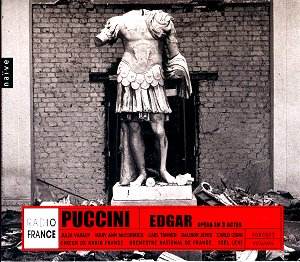Edgar,
Puccini’s second opera, has not been lucky, either in the opera
house or on disc. It is never given in production these days,
which would lead you to expect, as with other rare operatic fare,
that the gramophone would come to the rescue. In fact, the only
version available to collectors until now has been the Sony set
from the late 1980s, which was edited from live Carnegie Hall
performances. It had a couple of vintage leads in Scotto and Bergonzi,
but was generally thought of as nothing more than a stop-gap,
with an under-rehearsed third act and rather lacklustre conducting
from Eve Queler.
So
following on from their reasonable success with Le Villi,
French Radio come to the rescue with this concert version conducted
with great passion and commitment by a current master of the big,
broad canvas, Yoel Levi. One of the problems with this work is
that the composer himself never believed in it, deriding it to
the very end; in one of his most famous letters he refers to it
as ‘a blunder … as an opera, it is non-existent’. There is truth
in that, and it is obvious at many points that Puccini is setting
a libretto that is not right for him; small wonder that he was
so choosy from then on!
The
story centres around a medieval knight who has to choose between
the symbolically named Fidelia (the nice one, of course) and the
darker figure of Tigrana, a Carmen figure but without the sparkle
or originality. This sort of ancient fantasy did not suit the
composer whom, as we now know needed figures and situations rooted
in realism to ignite his creative spark.
Having
said all that, this is great composer-in-waiting, and there is
much to enjoy, especially when the piece gets the right degree
of belief and commitment, as it does here. Levi plays the score
as if it’s top-drawer Puccini, and though the only really star
name here is Julia Varady, the rest are in good voice and clearly
enjoy their big moments. In fact, this is one of those pieces
where it’s better not to question what’s going on; better let
it wash over you and enjoy hearing a young composer at least occasionally
hitting the mark.
These
moments make this opera worth persevering with, and some will
be familiar to fans of the composer. The Preludes to Acts 1 and
3 featured on an excellent early 1980s Decca disc from Riccardo
Chailly of unfamiliar orchestral extracts, and they show traits
of the later Puccini. Also the Requiem that follows the Act 3
Prelude became well known, and Toscanini conducted the Funeral
March when it was played at the composer’s own funeral.
As
already mentioned, vocal performances are good, with only Carl
Tanner in the title role sounding slightly strained above the
stave. In fact, the two women and the character of Frank get many
of the best tunes, and they are more than adequate. The orchestra
is on excellent form, with Levi pacing well and unleashing a suitably
big noise at climaxes. In many ways, the idea of recording in
concert proves ideal for opera; one gets the tension of ‘live’
performing with none of the drawbacks of noisy stage action and
aria applause. In the present case, one is only dimly aware of
an audience, and the odd footstep across the stage is the only
thing that betrays its ‘live-ness’. Recording quality is excellent,
as should be expected from such a seasoned source as Radio France
(the recent Haitink Pelleas originated here). Decent packaging
is a plus, with full text, translation and readable liner notes.
Let
us hope that this set does well and makes out a case for this
opera, which is surely not the unmitigated disaster the composer
(and others) would have us believe.
Tony
Haywood
